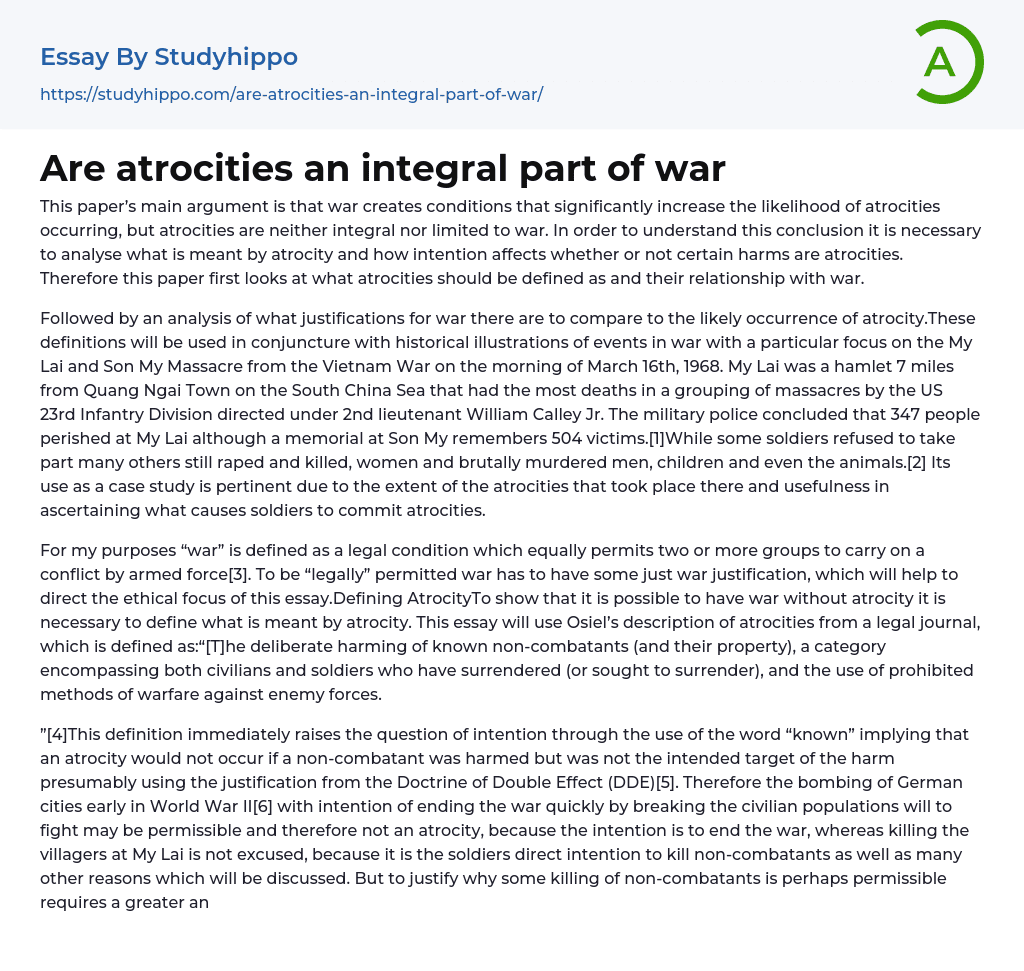The primary point of this paper is that war induces circumstances that considerably raise the probability of atrocities transpiring, but atrocities are not exclusively a part of war. To comprehend this assertion, it is crucial to dissect the notion of what constitutes an atrocity and how intent plays a role in determining whether specific harms qualify as atrocities. Hence, this paper initially examines the definition of atrocities and their association with war.
The text discusses what justifications for war can be compared to the likelihood of atrocity, with a focus on the My Lai and Son My Massacre from the Vietnam War on March 16th, 1968. The My Lai hamlet had the most deaths in a grouping of massacres by the US 23rd Infantry Division led by 2nd lieutenant William Calley Jr. Military police reported 347 deaths, although a memorial at Son My remembe
...rs 504 victims. Despite some soldiers refusing to participate, others still committed acts such as rape, murder of women and men, children, and even animals. Using this event as a case study is significant in understanding why soldiers commit atrocities.
Defining "war" as a lawful circumstance where multiple groups can engage in armed conflict [3], this essay focuses on the ethical implications of a legal justification for a just war. To demonstrate that it is possible to participate in warfare without committing atrocities, an explanation of the term "atrocity" is necessary. Osiel's definition from a legal publication characterizes atrocities as "[T]he intentional harm inflicted upon known non-combatants (and their possessions), including both civilians and soldiers who have surrendered (or attempted to surrender), and the use of forbidden methods against enem
forces."
The definition of atrocity uses the word "known" and raises questions about intention. This implies that harm to non-combatants would not be considered an atrocity if it was unintentional, based on the Doctrine of Double Effect (DDE). For example, bombing German cities in World War II with the intent of breaking civilian morale may be permissible since the goal is ending the war. However, killing villagers at My Lai cannot be excused because soldiers directly intended to harm non-combatants. This essay explores DDE further to justify why some killing of non-combatants may be permissible and how a soldier's intention determines whether an incident is considered an atrocity. Therefore, further analysis of DDE is necessary to prove a soldier's actions had good intentions.
In his analysis, Walzer identifies the four conditions of DDE. Firstly, an act must be good in itself or at least neutral, indicating it could be a legitimate act of war. However, as the My Lai Massacre involved killing non-combatants, it does not meet this criterion as it is not a good act in itself. Although killing can be legitimate in war, the beating and rape are not as they only cause harm. Secondly, the direct effect must be morally acceptable such as destroying military supplies or killing enemy soldiers. Thirdly, the actor's intention should be good without evil ends or means. Finally, the good effect should adequately justify allowing the evil effect under Sidgwick's proportionality rule. My Lai massacre failed to satisfy these conditions and is classified as an atrocity under DDE. However, it serves to highlight that war can be fought without such atrocities.
3) The actor's intention is focused on
the acceptable effect, with no aim or means to achieve the evil effect, and takes steps to minimize it despite the costs. Defining what war is can be controversial. Lord Kitchener believed that "all war is an atrocity" which some use to support a pacifist view that there is no justification for war. However, war remains a frequent occurrence in the world, necessitating a system that encourages just conduct and cause for war - the just war theory. While Clausewitz may view war as boundless or guided by a Hobbesian necessity of nature, international law has specific rules set forth in treaties such as the Geneva Conventions (1949). Nonetheless, war is still a terrible experience as it results in killing with no possibility of return.
The state encourages breaking restraints, but it is important to protect from atrocity where non-combatants are killed. The justness of a political community's war must be considered as the aggressor is responsible for all consequences, especially non-combatant deaths. Philosophers have developed principles governing war's rules, including just cause, competent authority, comparative justice, right intention, limited objective, last resort, reasonable hope of success, proportionality and discrimination. This essay is focused on just conduct in war, but unjust conflict results in all killing by the aggressor being an atrocity. Therefore, atrocity is integral to all unjust wars.
- Values of Life essays
- Ethical dilemma essays
- Normative Ethics essays
- Virtue Ethics essays
- Belief essays
- Deontology essays
- Moral essays
- Virtue essays
- Work Ethic essays
- Jurisprudence essays
- Social Injustice essays
- Juvenile Justice essays
- World War I essays
- World War Ii essays
- Atomic Bomb essays
- American Civil War essays
- Attack essays
- Cold War essays
- Crimean War essays
- Emilio Aguinaldo essays
- Iraq War essays
- Korean War essays
- Nazism essays
- Nuclear Weapon essays
- Philippine Revolution essays
- Trench Warfare essays
- Vietnam War essays
- Western Front essays
- Diplomacy essays
- Emperor essays
- Rwanda essays
- Tribe essays
- Revolutionary War essays
- War of 1812 essays
- Mexican American War essays
- Hitler essays
- The Spanish American War essays
- League Of Nations essays
- Battle Of The Somme essays
- Treaty Of Versailles essays
- Fascism essays
- D-day essays
- Atomic Physics essays
- Atomic Bombings Of Hiroshima And Nagasaki essays
- Electron essays
- Acceptance essays
- Age Of Enlightenment essays
- Child Observation essays
- Confucianism essays
- Conscience essays




